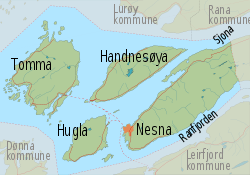Husby Estate
The Husby Estate (Norwegian: Husbygodset) is an estate in Helgeland, Norway. It is based in the village of Husby on the southwestern part of the island of Tomma in the municipality of Nesna.

Illustration: Commons user Finnrid
Photograph: Commons user Finnrid
History
Christensen family
Anders Christensen the younger (1751–1821), a shipper and a tradesman, and otherwise a great-great-grandson of the noblewoman Margrete Jonsdotter Benkestok, started in 1806 buying properties in Lurøy. He bought altogether twelve parts of the farms Grønningen, Kvitvær, Lunderøy, Måsvær, Sandvær, Sengstrag, Sør-Nesøy, and Trolløy. In 1819 he bought a part of Husby Farm, which until then had been a part of the Dønnes Estate.
After Christensen's death his widow Anna Catharine née Bernhoft continued buying properties. In 1825 she bought altogether nine parts of farms in the districts Meløy, Rødøy, and Lurøy. In 1833 she bought altogether twelve parts of farms in Lurøy. In 1834 she bought much land in the district Træna. Later followed the purchases of the trade seat Lurøysjøen, the trade seat Lauvøya, and Åkvik Farm.
Their son Frederik Christian Bernhoft Christensen (1800–1869) took over the Husby Estate. He was succeeded by his son Anders Christensen the younger (1840–1901). Anders Christensen married Johanne Marie Coldevin, the daughter of Isaach Coldevin, who was the owner of the considerably bigger Dønnes Estate. With her were 67 farm parts added to the Husby Estate. The estate thereby grew to consist of approximately 190 farm parts, making it a medium-sized estate in Northern Norway.
The couple's two daughters, Frederikke Christiane Christensen (1867–1887) and Jørgine Catharine Christensen (1872), did not reach adult age, wherefore the estate stood without heirs. Johanne Marie Christensen died in ca. 1895. In 1899 the widower Anders Christensen married Nathalie née Finchenhagen (1873–1955). Anders Christensen died in 1901, whereupon the widow inherited the estate. Nathalie had the Husby Chapel built to serve the local population in 1905.[1]
Gidtske family
In 1910 Nathalie Christensen married Karl Olaf Johan Karlsen Gidtske (1865–1948), a priest and a cand.theol., who thereby became the owner of the Husby Estate. During his time as a proprietarian some of the estate's many farms were sold, partly voluntarily and partly due to forced cession. When their son Kaare Krey Gidtske (1912–1995) in 1944 took over the estate it had been reduced to 50–60 farm parts of the original 190. Whatsoever, Gidtske continued selling away. In 1974 even Husby Farm was sold.
The son of Kaare Gidtske and Kirsten née Jacobsen (1923–2009), Karl Gidtske the younger, is today's estate owner and as such one of the biggest landowners in the County of Nordland.
In the 2000s some properties belonging to the estate were sold out of the family. Kaare Gidtske's widow, Kirsten Gidtske, would not accept this, wherefore she in 2007 used her right of preemption and bought the properties back for 5,500,000 crowns. To the newspaper Rana Blad she stated that she had bought the properties so that they shall remain within the family.[2][3]
See also
References
- Helgeland Museum: Husby Kapell Archived 2011-10-06 at the Wayback Machine
- Rana Blad: Eiendommene blir i familien
- Norwegian: Det er jeg som har kjøpt eiendommene. Dette har jeg gjort kun for at de fortsatt skal være i familien.